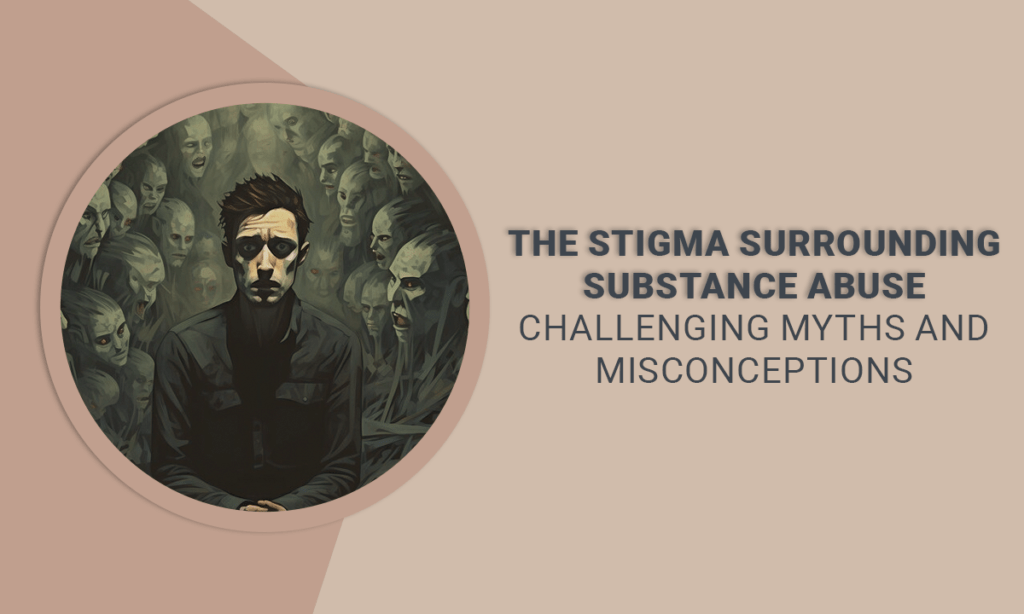Introduction
Substance abuse is a widespread problem affecting millions of people, regardless of gender, age, or socio-economic status. The stigma associated with it often prevents it from being addressed. This article will analyse the stigma surrounding substance abuse, challenging the myths and misconceptions that contribute to it. Understanding the realities of substance abuse and addiction can promote a more compassionate and practical approach to addressing this pressing public health concern.
Myth 1: Substance Abuse Is a Choice
One of the most common myths surrounding substance abuse is the idea that it’s simply a matter of choice. Many people believe that individuals struggling with addiction are making a conscious decision to use drugs or alcohol. However, addiction is a complex and multifaceted condition that involves changes in the brain’s structure and function. It is not a matter of free will.
Addiction often begins with voluntary substance use, but over time, the repeated use of these substances can alter brain chemistry. These changes can lead to a compulsive and uncontrollable need for the substance, making it exceedingly difficult to quit. The National Institute of Mental Health and Neurosciences (NIMHANS) has described addiction as a “chronic, relapsing brain disease.” This scientific understanding of addiction disproves the idea that people may simply choose not to use drugs or alcohol.
Myth 2: Only Certain Types of People Are Vulnerable to Substance Abuse
Another common misconception is that substance abuse is limited to a specific demographic or personality type. In reality, addiction knows no boundaries and can affect anyone, regardless of personal characteristics or background. While genetics and environmental factors can influence a person’s susceptibility to addiction, no one is immune.
People from all walks of life, including professionals, parents, students, and individuals from various socio-economic backgrounds, have experienced substance abuse. The belief that addiction only impacts a certain “type” of person can hinder efforts to provide support and treatment to those in need, as it perpetuates the stigma surrounding addiction.
Myth 3: People with Substance Abuse Issues Are Morally Flawed
Stigmatising attitudes often portray individuals with substance abuse issues as morally flawed or weak-willed. This harmful stereotype oversimplifies the complexity of addiction and undermines efforts to help those affected. It’s crucial to recognise that addiction is a health issue, not a character flaw.
The Indian Society of Addiction Psychiatry (ISAP) defines addiction as a “disorder of the brain that is characterized by compulsive drug seeking and use, despite harmful consequences.” This definition emphasises that addiction is driven by physiological and psychological factors rather than moral deficiencies.
Myth 4: Addiction Is a Lack of Self-Control
People often think that those struggling with substance abuse should be able to quit using substances if they only had more willpower. However, addiction involves profound changes in the brain that can undermine an individual’s ability to control their substance use.
The brain’s reward system plays a big role in addiction. Drugs and alcohol can hijack this system, leading to intense cravings and a loss of control over substance use. This neurobiological aspect of addiction makes it far more complex than a mere issue of self-control. Practical treatment approaches recognise and address these neurological changes to help individuals regain control over their lives.
People Also Read: Buddhism and Dr. Ambedkar: Exploring His Spiritual Journey
Myth 5: Quitting Addiction Is Easy if You Want to
It’s a widespread misconception that quitting an addiction is easy, and all it takes is a strong desire to stop using. In reality, the process of overcoming addiction is often incredibly challenging, and it requires comprehensive support and treatment.
Addiction is characterised by withdrawal symptoms, intense cravings, and a high risk of relapse. Quitting without professional guidance can be both mentally and physically taxing. Treatment programs like counselling, medication, and support groups are often necessary to help individuals successfully overcome addiction.
Myth 6: Recovery From Substance Abuse is Impossible
While it’s important to challenge the misconception that addiction is a choice, it’s equally important to debunk the belief that recovery is impossible. Many people in recovery have successfully overcome substance abuse and rebuilt their lives. With the right support and treatment, individuals with addiction can achieve long-term sobriety and regain their health and well-being.
Recovery is a complex process that often involves multiple attempts and setbacks. It requires dedication, patience, and a supportive environment. By promoting a message of hope and emphasising the potential for recovery, we can reduce the stigma surrounding addiction.
Myth 7: People with Substance Abuse Issues Are Dangerous
Another stereotype contributing to the stigma surrounding substance abuse is the belief that people with addiction are inherently dangerous. This misconception often leads to fear and discrimination against individuals with substance abuse problems.
While it is true that some individuals with addiction issues may engage in harmful or illegal behaviours, it’s important to understand that this is not representative of everyone struggling with addiction. Most individuals with substance abuse problems don’t pose a direct threat to others and are mainly focused on obtaining and using drugs or alcohol.
Final Words
Addressing the stigma surrounding substance abuse is a crucial step in improving the lives of those affected by addiction and promoting healthier communities. By challenging the myths and misconceptions associated with addiction, we can promote greater understanding and empathy for individuals struggling with this complex issue.
